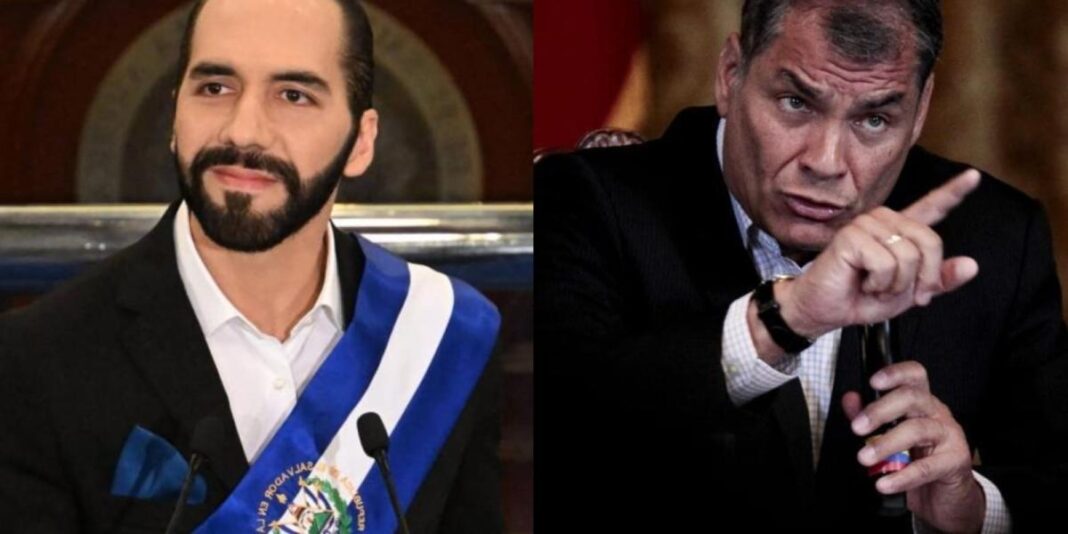BTN News: In a fiery exchange that has set social media abuzz, former Ecuadorian President Rafael Correa has sparked controversy by comparing El Salvador’s leader, Nayib Bukele, to Peru’s ex-president Alberto Fujimori. The remark, made via Correa’s official account on the platform X (formerly Twitter), quickly went viral, prompting an immediate response from Bukele. The confrontation highlights growing tensions in Latin American politics, with Correa drawing parallels between Bukele’s leadership style and that of Fujimori in the 1990s, raising questions about governance, democracy, and political legitimacy in the region. As Correa continues to fight legal battles from his exile in Belgium, his remarks signal a broader strategy aimed at influencing Ecuador’s political landscape ahead of the 2025 elections.
Correa Draws Parallels Between Bukele and Fujimori
Rafael Correa ignited the debate by stating on social media, “I remind you that Fujimori was the Bukele of the 90s. Look it up.” His message referenced the controversial legacy of Alberto Fujimori, a figure synonymous with authoritarianism and corruption in Peru. The comment was made in response to a viral video of a woman discussing Fujimori’s death and his governance.
Bukele Fires Back: “Who Is This?”
In a swift and dismissive retort, Nayib Bukele quoted Correa’s post with a simple, cutting question: “Who is this?” The response, laden with sarcasm, suggested Bukele’s disregard for Correa’s comparison and demonstrated his combative social media style, which has become a hallmark of his presidency.
Political Tensions Rise Amid Correa’s Legal Troubles
Correa’s public engagement in political debates comes as he remains in exile in Belgium, where he has held refugee status since 2017. The former Ecuadorian president faces an eight-year prison sentence in Ecuador for his involvement in the “Case Sobornos 2012-2016,” a corruption scandal involving bribery. Correa, however, maintains that the charges against him are part of a larger strategy to “judicialize politics” in Ecuador and silence his political movement.
Exile and Aspiration: Correa Eyes 2025 Return to Power
Despite his current exile, Correa is optimistic about his political future. In recent statements to the press, he asserted that his return to Ecuador is merely “a matter of time.” The leader of the Revolución Ciudadana movement is counting on a victory in the 2025 elections, which he believes will pave the way for his comeback. “We are the largest movement, thanks to God and the Ecuadorian people, and we have great faith in winning in 2025,” he emphasized.
Broader Implications for Latin American Politics
The clash between Correa and Bukele goes beyond a mere social media spat. It reflects broader political tensions in Latin America, where leaders often face accusations of authoritarianism, corruption, and the erosion of democratic norms. Correa’s attempt to draw parallels between Bukele and Fujimori serves to warn against what he perceives as a dangerous trend toward authoritarian rule in the region.
The Judicialization of Politics: A New Strategy?
Correa’s claim of a politically motivated legal campaign against him has been echoed by other members of his political party. He asserts that many senior figures in his movement are either in exile or imprisoned under what he calls “the most infamous persecution.” As the 2025 elections approach, Correa’s narrative of victimhood and resistance could gain traction, especially among those disillusioned with the current Ecuadorian government.
What’s Next in the Correa-Bukele Saga?
So far, Rafael Correa has not responded to Bukele’s recent jab, but the ongoing exchange has undoubtedly captured the attention of political observers and citizens alike. With both leaders known for their outspoken nature, it remains to be seen how this latest chapter in their feud will unfold. Meanwhile, Correa’s focus remains on the future of his political movement and the possibility of reclaiming power in Ecuador.
Conclusion:
As the political landscapes of Ecuador and El Salvador continue to evolve, the verbal skirmish between Rafael Correa and Nayib Bukele underscores the complex dynamics at play in Latin American governance. While Bukele dismisses Correa’s comments as irrelevant, Correa’s strategic use of historical comparisons and claims of judicial persecution could shape public opinion and influence upcoming electoral outcomes.


